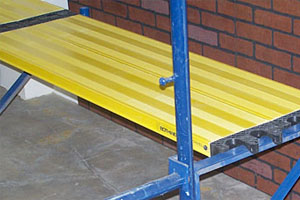Composite Planking System
By Masonry

Solid sawn lumber and laminated veneer lumber continue to be the leading choice among mason contractors for scaffold planking, but a new product introduced earlier this year might convince some contractors that plastic planking is better for their working conditions.
The Bothwell Plank System from Bothwell Enterprises Inc. of San Bernardino, Calif., is a lightweight, durable composite material that meets or exceeds all OSHA/ANSI standards for access platforms. It is designed to be compatible with existing frame and system scaffolding. Inventor and former scaffolding contractor Tim Bothwell spent more than seven years developing
his composite plank, which he describes as non-conductive, non-corrosive, non-slip and non-lap. The plank was designed largely to compete with aluminum and steel planking systems, but it still may find a niche in the masonry market.
According to Bothwell, other benefits of the system include the fact that each plank is two-thirds the weight of a wood plank, making it easier to handle. "You get fewer back injuries," he said. Also, the planks are available in virtually any color, and contractors can get anything they want printed on the sides. "It makes it pretty easy to identify your own plank," Bothwell said.
While owning a scaffolding company, Bothwell came up with the idea in 1998 after years of frustration in dealing with traditional wood plank in the hot, arid Southern California climate.
"I had a lot of contracts out in the Palm Springs/Palm Desert area where it can get up to 120 degrees," he said. "I'd go buy 100 [wood] planks, and within two or three weeks, 10 percent of those planks would split and crack because of the heat. ... I was spending about $50,000 a year just keeping my plank inventory even, and I was a very small contractor. I wanted to come up with something that would last longer."
Bothwell sold his scaffolding company that year to focus fulltime on his new idea. For nearly seven years, Bothwell essentially lived off of his savings, while working to perfect his plastic plank. Running low on cash, he eventually decided that he needed investors. He put a corporation together and started selling stock.
It wasn't long before he started gaining the attention of major investors. Bemis Manufacturing in Sheboygan Falls, Wis., gave Bothwell access to its engineers and manufacturing facilities in 2002, where he later developed his first prototypes. DOW Chemical and GE Plastics also took a keen interest.
Bothwell's team of designers, engineers and manufacturers soon determined that a pultrusion process was the most successful and prudent way to create a strong, stiff, lightweight plastic plank. He then was introduced to the president of the Italian glassmaker TopGlass s.p.a. in Milan in 2004. Known as one of the world's leading pultrusion companies, TopGlass further refined the Bothwell Plank System, creating a composite of polyester resin and glass fiber reinforcement that is the heart of the system today.
"We came up with a pultrusion plank and a mold-injected end connector around a steel insert. That eliminates all the lapping and the hazards of wood plank," Bothwell said.
They even designed a test machine to ensure that the planks comply with OSHA and ANSI standards.
The initial cost of the system is approximately twice the price of a comparable wood plank system, but the difference can be made up over the lifetime of ownership. "If you take care of them ... they'll last 10 to 20 years," Bothwell said. "You can lose color, but you'll never lose the mechanical properties."
The planks are available now, sold directly from Bothwell Enterprises' warehouse in Upland, Calif.
About the Author
Masonry, the official publication of the Mason Contractors Association of America, covers every aspect of the mason contractor profession - equipment and techniques, building codes and standards, business planning, promoting your business, legal issues and more. Read or subscribe to Masonry magazine at www.masonrymagazine.com.


















